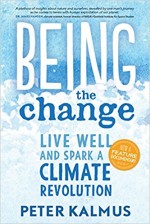 Many people are concerned about global warming but how many people actually have changed their lives to improve the situation? Author Peter Kalmus, an atmospheric scientist from Columbia University, is one those people who has done it. Living with his wife and two children in Altadena, California, he reduced his family’s use of fossil fuels to 1/10th of that used by the average American. His book, Being the Change, relates his experience and the joys he encountered.
Many people are concerned about global warming but how many people actually have changed their lives to improve the situation? Author Peter Kalmus, an atmospheric scientist from Columbia University, is one those people who has done it. Living with his wife and two children in Altadena, California, he reduced his family’s use of fossil fuels to 1/10th of that used by the average American. His book, Being the Change, relates his experience and the joys he encountered.
Kalmus’ journey involved intellectual understanding of the facts, practical considerations, and spiritual awakening. Beginning with meditation and gardening that connected him to himself, other people, and nature , Kalmus embarked on a personal response to the problem of climate change. He introduces his experience by presenting a solid foundation of the scientific facts concerning global warming and suggests words and concepts that should be abandon and replaced such as biosphere for environment, low energy for “Green” and regeneration for sustainable. A consideration of the impacts of global warming covers such problems as destructive weather patterns and rising sea levels as well as civil unrest and mass migration. Believing that our mindset is all important to the success of solving the problems of global warming, Kalmus explores some of the myths, paradigms, and mental habits that lead us to underestimate the urgency and seriousness of the problem.
Kalmus acknowledges that personal action may seem insignificant but he describes the changes he has made in his life in response to concerns about global warming and shares the satisfaction and joy he has found through his changes. These changes include riding a bike, having a vegetable garden, using waste vegetable oil for fuel, buying less goods, war tax resistance, meditation, building furniture (directions for a California bedstead are included), and dumpster diving for food. Frankly, this last one is a bit much for me and I prefer his suggestions for foraging that includes eating acorns, stinging nettles, and miner’s lettuce. These are all just suggestions, however, and Kalmus notes that his way of responding to climate change will be different from other people’s because everyone differs in regard to interests, talents, responsibilities, priorities, and principles. His main points are hat people should change in response to their own reality and do so for the joy that it brings rather than from guilt.
The buy Being the Challenge from Amazon.com, Click Here